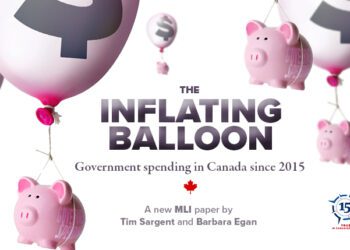Writing in the Globe and Mail, Macdonald-Laurier Institute Brian Lee Crowley says it’s time for Canada to strengthen its intellectual property regime.
This, he says, is one way the country could improve on its poor performance when it comes to investment in new research and development.
“We’ve been world leaders in throwing government cash at R&D with far too little to show for it”, writes Crowley. “Maybe it’s time we changed tack and tried owning the IP podium instead of subsidizing it”.
By Brian Lee Crowley, Feb. 5, 2015
During my time working for the UN in the Congo (or Zaire as it then was), I became good friends with a successful Ismaili businessman who had built a lovely home in the hills overlooking a mist-covered lake in the east of the country.
One day a Zairean army general drove up to the house and looked around appreciatively at the view, the grounds and the house. He knocked on the door and said to my friend, “You have a beautiful home here. You have 24 hours to get out. It’s mine now.”
This appalling story isn’t merely about arbitrary abuse of power in lawless lands. It is an object lesson in the incredible power of property rights to unlock prosperity and conversely how their absence is so frequently the cause of the impoverishment of entire societies.
My friend had title to his land and had honestly earned the money with which he built his house. But he lived in a society without the machinery to give his property rights solidity. Men with guns could override deeds and contracts with impunity. Thus few people could risk investing in power plants and apartment buildings, dams and railways. Only big international players who could afford their own armed men and could bribe governments to leave them alone could afford to invest, and even those ventures were highly risky because who knew what would happen if the government fell or the president died?
The stability of property and its transference by consent were thus rightly called by the great Scottish philosopher David Hume two of the three rules which underpinned truly civilised societies (the third was the keeping of promises). Strong, reliable and consistent property rights unlock prosperity because they reduce conflict, promote stewardship and reward investment.
The benefits of a strong regime of property rights apply just as much to intangibles as to land and goods. We long ago worked out how to make the ownership of cars and houses and factories work, but we are not always as effective at protecting the interests of the originators of an idea, the creators of a work of art or design, or the inventors of a scientific process. Yet the benefits from clear ownership of intellectual property (IP) are every bit as clear as those flowing from the ownership of land and buildings. Those of us who watched the ease with which the private sector beat the government in mapping the human genome is but one recent example of the galvanising effect IP can have on investment in R&D.
People who are rightly aghast at what happened to my Zairean friend are often prepared to wink at file-sharing, that robs musicians of their right to a return on their creative labours, or think nothing of loading up on counterfeit designer goods on trips to Asia. They sometimes also applaud government efforts to whittle away at the effective life of patents on therapeutic drugs.
Yet in each one of these cases of IP, the coveted objects only exist because of the effort and investment of the creators of the original idea. A strong IP regime therefore unlocks creativity, surely one of the keys to prosperity in a society increasingly dependent on intangible services for its wealth creation. Ultimately all wealth is created by human knowledge, and increasingly the wealth of societies like Canada takes the form of the fruits of our fertile minds, in software, design, film, fashion, engineering, disease control and more.
But while it is easy to lay out the theoretical case for strong property rights in IP the very intangibility of the property in question can make the whole topic seem abstruse.
But poor protection of intangible property has a very tangible cost, documented in detail this week in the US Chamber of Commerce’s release in Washington of the International Intellectual Property Index, a kind of report card on the IP regimes in place in 30 of the most developed nations and the impact that strong IP protection has on economic performance. Among the findings: Economies with strong IP systems see higher levels of investment in R&D and they employ a higher share of their workforce in knowledge-intensive sectors. In the life sciences, strong IP protection correlates with higher levels of investment.
Canada, which frequently laments its poor R&D performance, justly places poorly in this international IP ranking (fewer than 18 points out of a potential 30, compared to Australia’s 24.7, Britain’s 27.6 or the top-ranked US’s 28.5). We’ve been world leaders in throwing government cash at R&D with far too little to show for it. Maybe it’s time we changed tack and tried owning the IP podium instead of subsidizing it.




